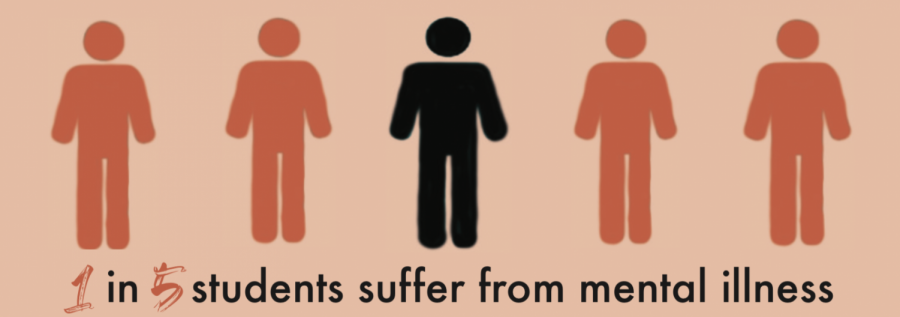Ferris Bueller had it right all along
A new law gives students the right to take a mental health day
Graphic courtesy of Ashley Sample
According to the cdc, cdc.com, and teenmentalhealth.gov one in 5 students suffer from mental illness.
March 9, 2020
Story originally published in the January 2020 edition of The Paw, our quarterly magazine.
Ferris Bueller had the art of skipping school down to an elaborate art form. Most students aren’t that sophisticated, but luckily, should they decide they need a mental health day, they don’t need to stress any more.
The state of Oregon introduced a new bill on July 1.
A new Oregon law allows students to take “mental health days” off from school, just as they would sick days.
House Bill 2191 was signed into law by Gov. Kate Brown and effective as of July 1. Under the state’s new law, students can have up to five excused absences in a three-month period, which can now be either a sick day or a mental health day. Before students could only have an excused absence from a parent, doctor of professional.
The bill attempts to treat mental health and physical health equally. The Oregon bill was initially dreamed up by high school students, who realized that Oregon has a high teenage suicide rate and who recognized that many of their peers were suffering from anxiety and other mental health issues.
The students behind the law don’t expect their peers to start acting like Ferris Bueller. Instead they hope students, rather than lying to parents and faking sick, will be more likely to open up about their mental health issues.
“I don’t think I have a really good answer to what a mental health day is because that would be up to each individual person to determine what a mental health day would be for them,” counselor Jason Ashley said. “I think for some people maybe they’re not physically sick like a cold or the flu but maybe they feel they need a day to recoup; not necessarily to avoid school work or tests.”
Ashley stated that if one suffers from depression, anxiety, panic attacks, or bipolar disorder, they may need to take a mental health day occasionally.
“I have taken a mental health day,” senior Meghan Turley said. “I get pretty nervous and overwhelmed easily, so it’s really nice to have a chance to just take a day off and put myself back together kind of.”
Turley says having the ability to take time off to recharge has been really helpful this year.
“I’m a really big believer that mental health should be treated the same way as physical health, and it’s really normalized to take a day off when you’re sick, so it should be the same way when you’re struggling with mental health.”
“It’s good but I also think they should teach kids more useful stuff about how to deal with mental health so there isn’t that much need for people to have mental health days,” senior Kylie Jackman said.
“It’s a good idea for people that actually have mental health problems but it’s going to get abused for the people that don’t that will just say they’re depressed and need a break today when they’re not actually and they’re just going to take a day off just because they don’t want to go to school,” sophomore Cadence Neal said. Neal has never taken a mental health day and does not know of anyone who has.
While the state tells students to take time away from school if they find it necessary, the state finds the chronic absenteeism percentage to be a problem. According to state data, in the school year 2017-2018, the states chronic absenteeism percentage rose nearly one percent, to 20.5 percent. Chronic absenteeism is defined as missing ten percent or more of a school year for any reason. The state has recently been trying to lower that percentage, but the new mental health days they have created may get in the way of that.
“They created these mental health days so kids and families could call the schools and say ‘I’m taking a mental health day’ but I think in our system it might just be in the system as an excused absence,” Ashley said.
He believes having them know it is excused may put them at ease.
“I think there are probably a lot of people that take mental health days and don’t call so it might just be in the system as an unexcused absence or they don’t want to say it’s a mental health day because they maybe wouldn’t want the label of someone saying they are taking a mental health day.”










